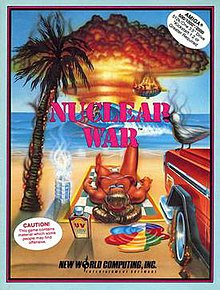Nuclear War (video game)
| Nuclear War | |
|---|---|
 | |
| Developer(s) | New World Computing |
| Publisher(s) | U.S. Gold |
| Designer(s) |
|
| Artist(s) | Avril Harrison |
| Platform(s) | Amiga, MS-DOS |
| Release | 1989 |
| Genre(s) | Turn-based strategy |
| Mode(s) | Single player |
Nuclear War is a single player turn-based strategy game developed by New World Computing and released for the Amiga in 1989 and later for MS-DOS. It presents a satirical, cartoonish nuclear battle between five world powers, in which the winner is whoever retains some population when everyone else on earth is dead.
Gameplay
The game's introduction includes an homage to Dr. Strangelove. Each player - one human, four computer-controlled - is represented by a caricature of a national leader (the MS-DOS version allowed more than one human player). If there is a computer-controlled winner at the end of the game, that leader is depicted jumping for joy in the middle of a blasted wasteland, crowing "I won! I won!". If the player wins only the high score board is shown. Once a player (computer or human) loses, all of their stockpiled weapons are automatically launched. It is possible for a game to have no winner because of this. If this happens, a cut scene of the earth shattering and exploding is shown, and the high score table appears (though without any new entries).
Characters
The following characters are available in the game; the public figure being satirized is listed in parentheses.
- Ronnie Raygun (Ronald Reagan)
- P.M. Satcher (Margaret Thatcher)
- Infidel Castro (Fidel Castro)
- Col. Malomar Khadaffy (Muammar al-Gaddafi)
- Ayatollah Kookamamie (Ruhollah Khomeini)
- Mao the Pun (Mao Zedong)
- Jimi Farmer (Jimmy Carter)
- Tricky Dick (Richard Nixon)
- Mikhail Gorabachef (Mikhail Gorbachev)
- Ghanji (Mahatma Gandhi)
Reception
In the July 1990 edition of Games International (Issue 16), Brian Walker didn't think this was a particularly challenging game, commenting, "All good clean fun with nothing to stretch the brain cells." He concluded by giving the game a rating of 7 out of 10 for gameplay and 8 out of 10 for graphics, saying, "What lifts the game above average is the omnipresent humour."[1]
In the July 1990 edition of Dragon (Issue #159), Hartley, Patricia, and Kirk Lesser characterized the game as "challenging", despite its tongue in cheek humour. However, they were disappointed that only one player could play the game at a time. Nevertheless, they gave the game an above-average rating of 41⁄2 out of 5.[2]
In the October 1990 edition of Computer Gaming World, Chuck Moss favorably reviewed the game's graphics, fast and brief game play, and humorous computer opponents.[3]
Surveys of opinions about wargames with modern settings conducted for Computer Gaming World in 1992 and 1994 awarded the game a rating of 31⁄2 out of 5.[4][5]
See also
References
- ^ Walker, Brian (July 1990). "Computer Games". Games International. No. 16. p. 40.
- ^ Lesser, Hartley; Lesser, Patricia; Lesser, Kirk (July 1990). "The Role of Computers". Dragon (159): 47–53.
- ^ Moss, Chuck (October 1990). "Itsy-Bitsy Teeny-Weeny 20-Megaton Bikini". Computer Gaming World. No. 75. p. 36. Retrieved 16 November 2013.
- ^ Brooks, M. Evan (June 1992). "The Modern Games: 1950 - 2000". Computer Gaming World. p. 120. Retrieved 24 November 2013.
- ^ Brooks, M. Evan (January 1994). "War In Our Time / A Survey Of Wargames From 1950-2000". Computer Gaming World. pp. 194–212.
External links
- Nuclear War at MobyGames
- Reviews at Amiga Reviews
- LemonAmiga docs, comprehensive introduction and guide
- 1989 video games
- Amiga games
- Cold War video games
- DOS games
- New World Computing games
- Political satire video games
- Turn-based strategy video games
- Video games about nuclear war and weapons
- Cultural depictions of Ronald Reagan
- Cultural depictions of Margaret Thatcher
- Cultural depictions of Fidel Castro
- Cultural depictions of Muammar Gaddafi
- Cultural depictions of Ruhollah Khomeini
- Cultural depictions of Mao Zedong
- Cultural depictions of Richard Nixon
- Cultural depictions of Mikhail Gorbachev
- Cultural depictions of Mahatma Gandhi
- Video games developed in the United States
